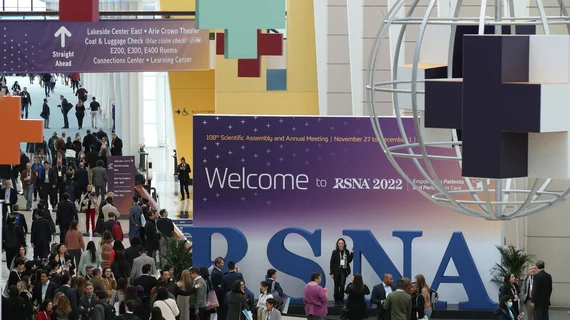RSNA alters timing for annual meeting
Get your long-term calendars out. One of the largest yearly conferences in healthcare is changing its schedule.
The Radiological Society of North America announced Thursday that its scientific assembly and annual meeting, long a mainstay the week after Thanksgiving, will run a week or so ahead of that holiday on odd-number years beginning in 2027.
The traditional post-Thanksgiving dates will remain for even-number years (2028, 2030, 2032 and so on).
The host venue will continue to be McCormick Place in Chicago.
In announcing the move, an RSNA exec says the decision came after the organization gave careful consideration to feedback offered by attendees as well as exhibitors.
“Our goal remains to make our annual meeting a premier destination,” says the source, John Jaworski, RSNA’s assistant executive director of meeting services and corporate relations.
He adds that the change reflects RSNA’s desire to keep the conference “convenient and accessible to all.”
Here’s the full schedule for the next handful of years as announced Oct. 26:
- RSNA 2024 – December 1 – 5; Exhibits, Dec. 1 – 4
- RSNA 2025 – November 30 – Dec. 4, Exhibits, Nov. 30 – Dec. 3
- RSNA 2026 – November 29 – Dec. 3, Exhibits, Nov. 29 – Dec. 2
- *RSNA 2027 – November 14 – 18; Exhibits, Nov. 14 – 17
- RSNA 2028 – November 26 – 30; Exhibits, Nov. 26 – 29
- *RSNA 2029 – November 11 – 15; Exhibits, Nov. 11 – 14
- RSNA 2030 – December 1 – 5; Exhibits, Dec. 1 – 4
- *RSNA 2031 - November 16 – 20; Exhibits, Nov. 16 – 19
- RSNA 2032 - November 28 – Dec. 2; Exhibits, Nov. 28 – Dec. 1
*week prior to Thanksgiving
The week after Thanksgiving has been the go-to time window for the event since the early 1930s, when meeting organizers prioritized economics and opted for the relatively low offseason rates. McCormick Place has hosted the conference nearly every year since 1975.

